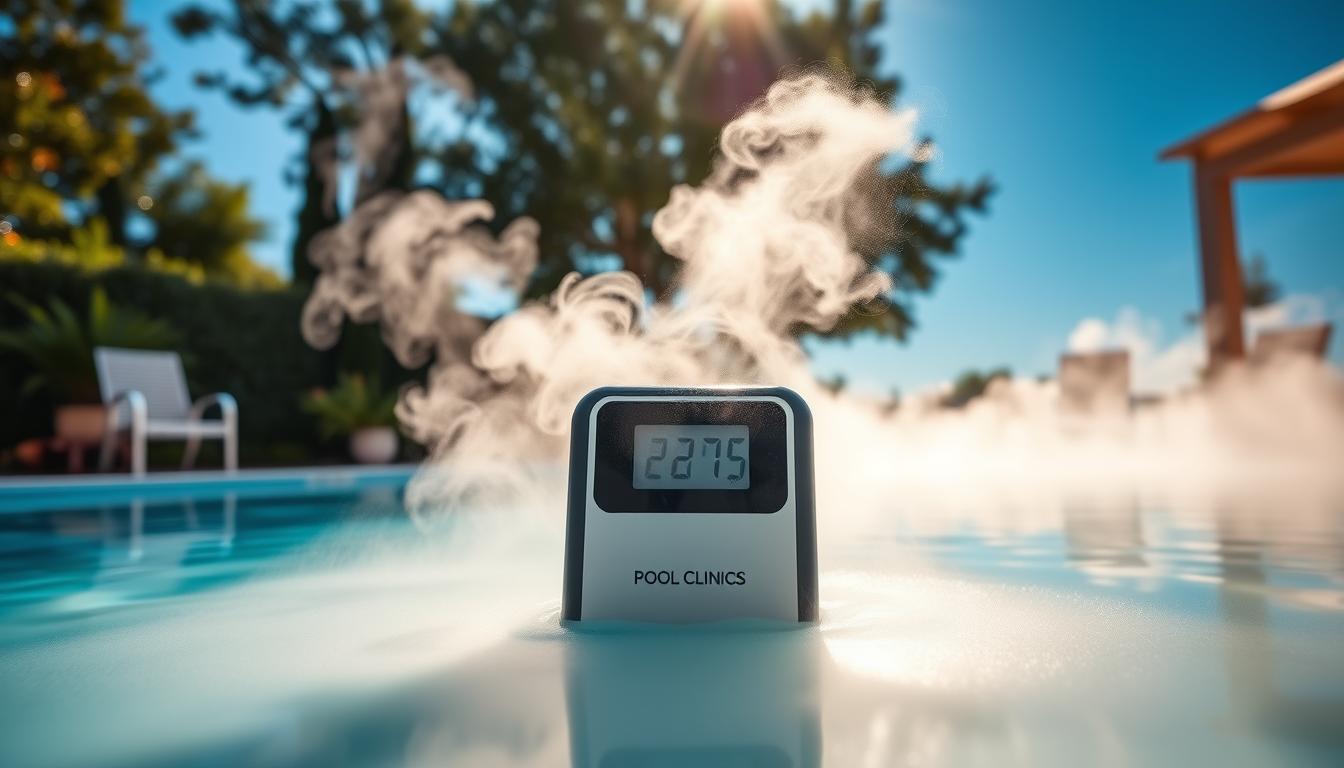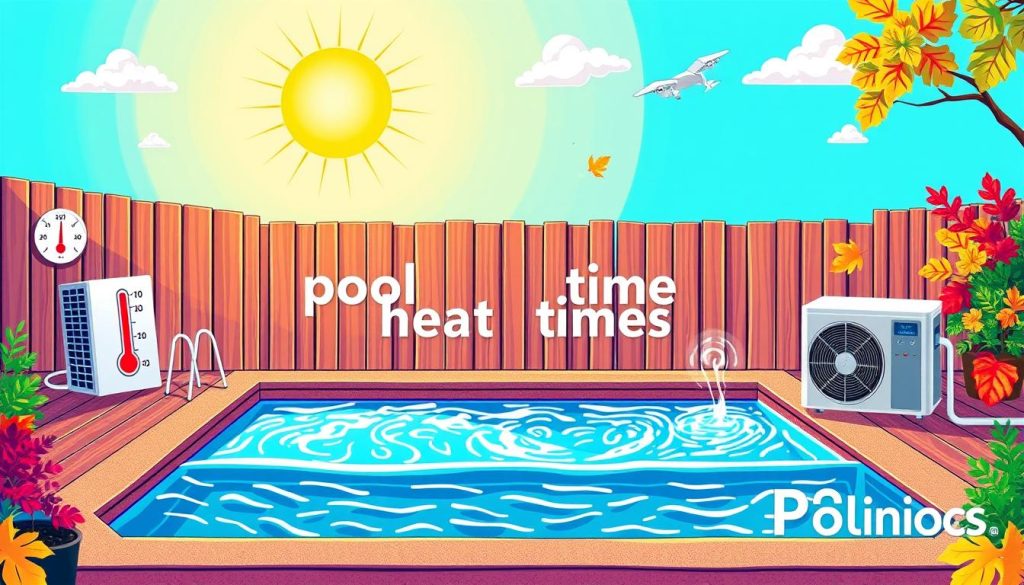
Heating a pool to the perfect temperature takes time and careful planning. Several factors affect how quickly your pool warms up. Understanding these elements helps create a comfortable swimming environment for you and your guests.
Pool size, heater type, and starting water temperature all impact heating time. Gas heaters can warm a pool in 8-12 hours. Electric heat pumps may need 24-48 hours or more. Solar heaters, using the sun’s energy, can take 24-72 hours.
Proper sizing and installation of the heating system are crucial. Regular maintenance also plays a key role. These factors maximize heater efficiency and minimize costs.
The surrounding environment affects heating time too. Trees or nearby buildings can create shade. Direct sunlight helps reduce heating time, letting you enjoy your pool sooner.
We’ll explore the factors influencing pool heating time and various heating options. This knowledge will help you make smart choices about your pool’s temperature control.
Key Takeaways
- Pool heating time varies from 8 to 48 hours, depending on factors like pool size, heater type, and starting water temperature.
- Gas heaters are the quickest, taking 8-12 hours, while electric heat pumps and solar heaters require more time.
- Proper sizing, installation, and maintenance of the heating system are essential for optimal pool heater efficiency.
- Surrounding structures and exposure to sunlight can impact the time needed to heat pool water.
- Understanding pool heating time is crucial for maintaining a comfortable and enjoyable pool environment.
Factors That Affect Pool Heating Time
Several key factors determine how long it takes to heat your swimming pool. Understanding these elements helps you make informed decisions about your pool heating system. You can choose the right heater and optimize its performance for faster, more efficient heating.

Pool Size and Volume
The size of your pool significantly impacts heating time. Larger pools need more energy and time to heat due to their greater water volume. A 20,000-gallon pool takes longer to heat than a 10,000-gallon pool.
When selecting a pool heater, choose a model with enough capacity to heat your pool efficiently. Consider your pool’s specific volume when making this decision.
Starting Water Temperature
The initial temperature of your pool water affects heating time. Cooler water, like in early spring, takes longer to reach your desired temperature. The bigger the temperature difference, the more time and energy your heater needs.
Desired Water Temperature
Your preferred pool water temperature impacts heating time. Higher temperatures, like 88°F (31°C), take longer to reach than moderate ones, like 78°F (26°C). Remember, higher temperatures consume more energy, affecting heating time and costs.
Heater Type and Efficiency
The type and efficiency of your pool heater influence heating time. Gas heaters are fastest, followed by electric heat pumps, then solar heaters. Higher-efficiency heaters warm your pool more quickly and effectively.
| Heater Type | Heating Speed | Energy Efficiency | Operating Costs |
|---|---|---|---|
| Gas Heater | Fastest | Moderate | Highest |
| Electric Heat Pump | Moderate | High | Moderate |
| Solar Heater | Slowest | Highest | Lowest |
Weather Conditions and Environment
External factors like weather and your pool’s surroundings affect heating time. Cooler weather and strong winds make your heater work harder and longer. Warmer air, direct sunlight, and sheltered environments speed up heating.
Using a pool cover reduces heat loss and minimizes evaporation. It keeps warm air trapped close to the water’s surface, helping maintain temperature.
Investing in proper pool heater installation and routine maintenance not only optimizes heating performance but also helps extend the life of your heating system, saving you time and money in the long run.
Understanding these factors helps you make smart choices about your pool heating setup. You can achieve your ideal water temperature quickly and efficiently. Consider these elements when choosing between gas, electric, or solar heating systems.
How Long Does a Pool Take to Heat?
Pool heating times vary based on the type of heater you use. Let’s explore different heating solutions and their estimated times. This guide will help you choose the best option for your pool.
Gas Heaters: 8-12 Hours
Gas heaters are the fastest option for heating your pool. They typically take 8 to 12 hours to reach your desired temperature. These heaters burn natural gas or propane, providing quick heating regardless of weather.
If you want to enjoy your pool quickly, a gas heater might be your best choice.
Electric Heat Pumps: 24-48 Hours
Electric heat pumps are more energy-efficient than gas heaters but take longer to heat. On average, they need 24 to 48 hours to warm a pool. These pumps extract heat from the air and transfer it to the pool water.
Heat pumps balance efficiency and performance, making them a cost-effective option in the long run.
Solar Heaters: 24-72 Hours
Solar heaters are the greenest option for pool heating. They use the sun’s power to warm your pool water. However, they’re the slowest, taking 24 to 72 hours to heat a pool.
Solar heaters need plenty of sunlight to work well. They’re ideal for sunny areas or those wanting to reduce their carbon footprint. While costly upfront, they offer long-term savings.
Using a Pool Cover for Faster Heating
A pool cover can greatly reduce heating time by keeping heat in. It helps your heater work more efficiently, especially at night or on cool days. Using a cover lets you enjoy a warmer pool faster.
This strategy also saves energy and cuts down on operating costs.
| Pool Size | Gas Heater | Electric Heat Pump | Solar Heater |
|---|---|---|---|
| Small (up to 55,000 liters) | 6-8 hours | 24-36 hours | 24-48 hours |
| Medium (55,000 – 115,000 liters) | 8-10 hours | 36-48 hours | 48-72 hours |
| Large (over 115,000 liters) | 10-12 hours | 48-60 hours | 72-96 hours |
Choose a pool heating solution that fits your budget and needs. Consider heating speed, energy efficiency, and environmental impact. Understanding heating times and using tips like pool covers will ensure a comfy swim all season.
Conclusion
Heating a pool to a comfortable temperature depends on many factors. Pool size, heater type, and starting water temperature all affect heating time. Weather conditions and desired temperature also play a role.
Gas heaters are the fastest, taking 8-12 hours to heat a pool. Electric heat pumps need 24-48 hours, while solar heaters require 24-72 hours.
Choosing the right heating solution is key for efficient pool heating. Proper sizing, installation, and maintenance ensure optimal performance and energy efficiency. Using a pool cover can reduce heating time by keeping the warmth in.
Understanding these factors helps create a cozy swimming environment during pool season. Selecting and maintaining the right system lets you enjoy your pool whenever you want. No more long waits or inefficient heating to worry about.







